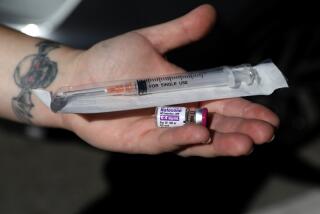Chemical compound helps neutralize cocaine, researchers say
- Share via
Cocaine is highly addictive. But cocaine’s appeal can be greatly reduced, if not wiped out, by activating a particular type of receptor in the brain, a new study suggests.
Researchers from the National Institute on Drug Abuse and the Beijing Institute of Pharmacology and Toxicology trained several types of mice to give themselves cocaine. Then they gave the animals a compound called JWH133, which turns off a cannibinoid receptor called CB2.
Normal mice responded by giving themselves less cocaine. In fact, the more JWH133 they got, the less cocaine they wanted. By giving the mice a series of other compounds, the researchers deduced that the reason the mice dialed back their cocain habits was that the drug no longer made them feel so good.
But the scientists got different results in mice that were altered so that their CB2 receptors were knocked out. For these mice, administration of JWH133 had no effect on cocaine usage.
And there was other evidence that the compound could block cocaine’s effects. When the normal mice got cocaine, they ran really fast on a spinning rod (think of it as the rodent equivalent of a log-rolling contest). When the mice got JWH133, they ran slower. But the CB2 knockout mice were once again unaffected by JWH133, running as fast as ever after getting a dose of cocaine.
Treating strung-out mice isn’t a huge priority for medical researchers, but the people who did this study say they are hopeful that the compound – or something like it – could be used to help human cocaine addicts, as well as people addicted to other drugs.
The study was published online Sunday in the journal Nature Neuroscience.





